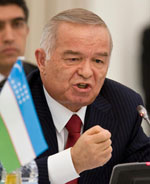Attacks on the Press 2009: Kazakhstan
Top Developments• Repressive media law takes effect, sets limits online.• Politicized lawsuits threaten independent newspapers. Key Statistic 2010: Year that Kazakhstan assumes chairmanship of OSCE. The authoritarian government of this central Asian nation brazenly defied international standards for freedom of expression even as it prepared to assume chairmanship of the Organization for Security and Co-operation in…
Attacks on the Press 2009: Kyrgyzstan
Top Developments• Saipov murder case unsolved and beset by questions.• Four journalists badly beaten; no arrests made. Key Statistic 76: Percentage of vote won by Kurmanbek Bakiyev in flawed presidential election. The press climate deteriorated in this mountainous central Asian nation that once offered promise for democracy and free expression. The government’s erratic investigation into the…
Attacks on the Press 2009: Uzbekistan
Top Developments• Nation is a persistent jailer of journalists.• Security agents enforce rigid censorship. Key Statistic 4: Years EU human rights sanctions were in place before being lifted in 2009. President Islam Karimov’s authoritarian government held at least seven journalists in prison, retaining its notorious distinction as the region’s leading jailer of journalists. Authorities harassed independent…

Karimov chastises Uzbekistan’s ‘toothless’ reporters
Addressing the joint session of Uzbekistan’s parliament on Wednesday, President Islam Karimov urged his lawmakers to be more active in their work, saying that laws should address public needs, and blaming the local press corps for being “toothless” in its reporting, regional news Web site Ferghana reported. In his speech, available on the parliament’s Web site, Karimov, at…
Attacks on the Press in 2008: Uzbekistan
Throughout the year, President Islam Karimov’s administration sought to persuade the European Union and Western nations that it was on a path of reform. It urged the EU to lift sanctions imposed in 2005 after Uzbek troops killed hundreds of citizens during antigovernment protests in the eastern city of Andijan. Lobbying efforts notwithstanding, the government…
Attacks on the Press 2007: Tajikistan
TAJIKISTAN Beginning his 16th year as head of state, President Emomali Rahmonov promoted policies to foster “national identity.” He abolished Russified endings from Tajik surnames—and started by cutting the suffix “ov” from his own surname and decreeing that he be called President Rahmon. The newly renamed president went on to prohibit students from driving cars…
Attacks on the Press 2007: Turkmenistan
TURKMENISTAN The sudden death of President-for-Life Saparmurat Niyazov in December 2006 marked an end to an eccentric and authoritarian rule, raising modest hopes for social, economic, and political reform. Gurbanguly Berdymukhammedov, a deputy prime minister and Niyazov loyalist, was named interim leader and then became president in a government-orchestrated “election” in February.
Attacks on the Press 2007: Uzbekistan
UZBEKISTAN In power for nearly two decades, President Islam Karimov had little trouble securing another seven-year term in office. He faced three candidates but no genuine opposition in a December election that international observers said was neither free nor fair. Though constitutional term limits seemed to constrain the president from seeking re-election at all, the…
Attacks on the Press 2006: Tajikistan
TAJIKISTAN President Imomali Rakhmonov buried independent and international media under a blizzard of arbitrary licensing regulations, content restrictions, and fees. Though Rakhmonov faced no strong opposition in the November presidential election, his administration limited critical news coverage in the run-up to his victory over four little-known opponents. Regulatory agencies—wary, too, of the sort of news…
Attacks on the Press 2005: Europe & Central Asia Analysis
Free Expression Takes a Back SeatBy Alex Lupis To gain military footing and access to energy resources in the former Soviet empire, the United States has diverted its attention from human rights and press freedom issues in Eurasia. The U.S. policy of close cooperation with the region’s authoritarian leaders has undermined free and independent reporting in…